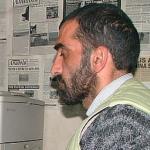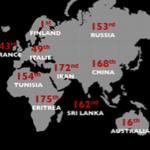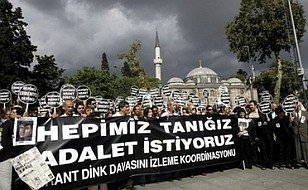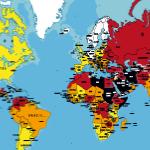Every year, the Reporters Without Borders (RSF) publishes a "Worldwide Press Freedom Index". This year, Turkey has dropped three places down to the 101st position. There are 169 countries on the list.
Until 2005, Turkey had made progress on the index, but the frequent violations of press freedom have led to lower ranking. Turkey is preceded by Indonesia and followed by Gabon.
First and last five
The first five countries are Iceland, Norway, Estonia, Slovakia and Belgium, while the last five are Cuba, Iran, Turkmenistan, Northern Korea and Eritrea.
Other countries
The USA ranks in place 48, France 31st, Greece 30th, Britain 24th, Germany 20th, and Italy 35th. Among the new members of the EU, Bulgaria ranks 51st and Poland 57th. Armenia is in 77th place, Azerbaijan 139th and Russia 144th.
Denmark, which, after last year's crisis on the caricatures of Prophet Muhammed, had slipped to place 19, is back in place 8.
Iraq, where 200 journalists have died and reporters have become the targets of armed groups since the occupation of March 2003, ranks in 157th place.
Palestinian Territories have suffered from the conflict between Hamas and El Fetih, resulting in more violations of press freedom, and thus a ranking of 158. Kidnappings, arrests, attacks and general pressure on journalists are common.
While Israel is ranked 44th for its domestic treatment of the press, it is ranked 103rd for its practices in the Palestinian territories. Similarly, the USA is ranked much lower, at 111th, for the pressure it puts on the press in other countries.
Index based on detailed questionnaire
On its website, RSF explains how the index is made:
"To compile this index, Reporters Without Borders prepared a questionnaire with 50 criteria that assess the state of press freedom in each country. It includes every kind of violation directly affecting journalists (such as murders, imprisonment, physical attacks and threats) and news media (censorship, confiscation of newspaper issues, searches and harassment). And it includes the degree of impunity enjoyed by those responsible for these press freedom violations."
"It also measures the level of self-censorship in each country and the ability of the media to investigate and criticise. Financial pressure, which is increasingly common, is also assessed and incorporated into the final score."
"The questionnaire takes account of the legal framework for the media (including penalties for press offences, the existence of a state monopoly for certain kinds of media and how the media are regulated) and the level of independence of the public media. It also reflects violations of the free flow of information on the Internet."
"Reporters Without Borders has taken account not only of abuses attributable to the state, but also those by armed militias, clandestine organisations and pressure groups." (EÖ/AG)
















